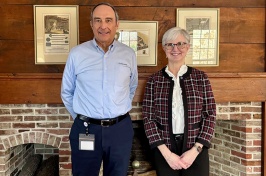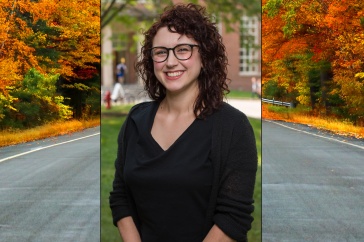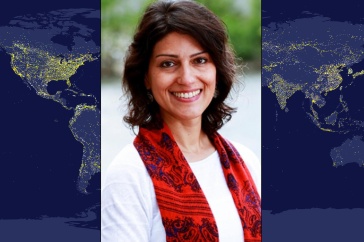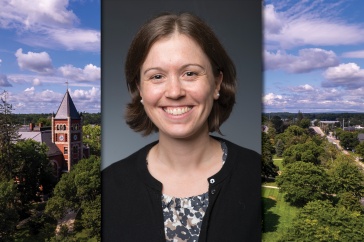Carsey's Academic Director Dan Bromberg sits down with Carsey School faculty member Carolyn Arcand to discuss the use of collaborative teaching simulations in public policy and administration classrooms and how students can learn from them while having fun.
  |
| Carolyn Arcand |
One key skillset in public administration and policy creation includes the ability to collaborate with people across the political and ideological spectrum to pass policies and laws that benefit the collective in an equitable manner. And one way to learn such a skill is the use of classroom simulations that teach collaborative governance and leadership.
Recently, faculty member Carolyn Arcand took home a top prize for a teaching simulation she introduced in her course, Financial Management and Budgeting in the Public and Non-profit Sectors, at the Carsey School of Public Policy. The award comes from the Program for the Advancement of Research on Conflict and Collaboration (E-PARCC) at the Maxwell School of Citizenship and Public Affairs at Syracuse University. Arcand won the top prize for teaching simulations at the 13th Annual E-PARCC Teaching Case and Simulation Competition held earlier this year.
Arcand created the simulation, titled “Who pays? What’s fair? Determining a parking fee structure for Fort Williams Park,” to test her students’ ability to think critically and solve problems within a “politically charged collaborative process.” She asked students to serve as members of a town government-formed committee charged with developing a parking fee structure for a local park. While personating local residents with varied viewpoints and goals, the students developed an equitable and politically feasible parking and payment structure that generates enough revenue to offset the costs of maintaining the park.
“I felt the simulation could just as easily work well as a more general exercise in collaboration, critical thinking, and conveying policy recommendations, so the revisions I made really made it more applicable to other types of courses.”
Arcand initially created the simulation to teach students to apply concepts in public finance to real and common local government issues, but upon review determined that the simulation could also serve a broader usage for programs – including public policy and public administration courses – that emphasize collaborative problem-solving.
“After completing the simulation with my class in 2019, I received good feedback from my students,” said Arcand. “I felt the simulation could just as easily work well as a more general exercise in collaboration, critical thinking, and conveying policy recommendations, so the revisions I made really made it more applicable to other types of courses.”
Arcand’s simulation will be made available on the E-PARCC website on July 6. E-PARCC provides “teaching tools that prepare future public administrators with skills” aimed at helping them to collaborate in organizations across the public, private, and nonprofit sectors. Those tools include publicly available and award-winning simulations and cases developed by instructors worldwide.
Interested in learning more about the Carsey School of Public Policy? Visit our Academics webpage.
-
Written By:
Nicholas Gosling '06 | COLSA/NH Agricultural Experiment Station | nicholas.gosling@unh.edu

















































